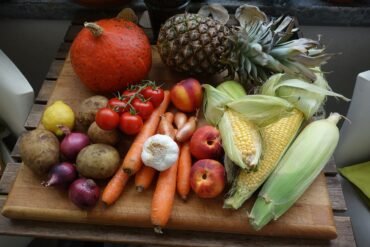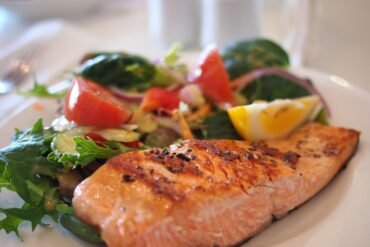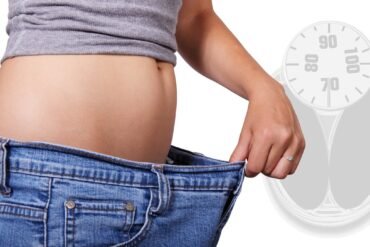Eating for Two: Nourishing Your Body During Pregnancy and Beyond

Table of Contents
- The Importance of Nutrition: Fueling a Healthy Pregnancy
- Key Nutrients for Mom and Baby: Focusing on Essential Vitamins and Minerals
- Building a Balanced Plate: Creating Nutrient-Rich Meals for Optimal Health
- Pregnancy Superfoods: Incorporating Powerhouse Foods into Your Diet
- Postpartum Nutrition: Nurturing Your Body After Delivery
The Importance of Nutrition: Fueling a Healthy Pregnancy
During pregnancy, a woman’s body goes through numerous physiological changes to support the growth and development of her baby. These changes require an increased intake of essential nutrients to ensure a healthy pregnancy and optimal fetal development.
Proper nutrition is vital, as it provides the necessary fuel and building blocks for the baby’s growth and development. Here are some key reasons why nutrition is crucial during pregnancy:
- Supports fetal development: Adequate nutrition, including a variety of vitamins, minerals, proteins, and fats, is essential for the development of the baby’s organs, brain, and nervous system.
- Prevents birth defects: Certain nutrients, such as folic acid, play a critical role in preventing neural tube defects and other congenital abnormalities.
- Boosts maternal health: Good nutrition during pregnancy can help reduce the risk of complications such as gestational diabetes, preeclampsia, and anemia.
- Supports healthy weight gain: Proper nutrition helps ensure a healthy weight gain, which is important for both the mother and the baby. Excessive weight gain can lead to complications during pregnancy and delivery.
- Enhances immune function: A well-balanced diet rich in vitamins and minerals strengthens the immune system, reducing the risk of infections and illnesses that can affect both the mother and the baby.
- Improves energy levels: Eating nutrient-dense foods provides the energy needed to support the physiological changes occurring during pregnancy and helps combat fatigue.
It’s important to adopt a balanced and varied diet to meet the increased nutritional needs during pregnancy. Focus on consuming a wide range of fruits, vegetables, whole grains, lean proteins, and healthy fats. Additionally, staying hydrated by drinking plenty of water is crucial.
Consulting with a healthcare provider or a registered dietitian is highly recommended to ensure that you are meeting your specific nutritional requirements during pregnancy. They can provide personalized guidance and help address any concerns or dietary restrictions you may have.
Remember, eating for two doesn’t mean doubling your food intake, but rather making wise choices to nourish yourself and your growing baby. Prioritizing nutrition throughout pregnancy will contribute to a healthy pregnancy, a smooth delivery, and the overall well-being of both you and your baby.
Key Nutrients for Mom and Baby: Focusing on Essential Vitamins and Minerals
During pregnancy, it is crucial for both mom and baby to receive the necessary nutrients for optimal health and development. While a balanced diet is essential, there are certain key nutrients that play a particularly important role. These nutrients include essential vitamins and minerals that support the growth and well-being of both mom and baby.
1. Folic Acid: Folic acid, also known as folate, is a B vitamin that is crucial for the early development of the baby’s neural tube. It helps prevent major birth defects of the baby’s brain and spine. It is recommended to consume at least 400 micrograms of folic acid daily, even before pregnancy begins.
2. Iron: Iron is essential for the production of red blood cells, which carry oxygen to both mom and baby. During pregnancy, the body’s blood volume increases, and the demand for iron rises. Consuming iron-rich foods such as lean meats, legumes, and leafy greens can help prevent iron deficiency anemia.
3. Calcium: Calcium is vital for the development of the baby’s bones and teeth. If the mother’s calcium intake is insufficient, the baby will draw calcium from the mother’s bones, potentially leading to bone density loss. Good sources of calcium include dairy products, fortified plant-based milk, and leafy greens.
4. Vitamin D: Vitamin D is crucial for the absorption of calcium and the development of the baby’s bones and teeth. It also plays a role in the immune system. While sunlight is a natural source of vitamin D, it may be challenging to get enough during pregnancy. Therefore, it is recommended to consider a vitamin D supplement.
5. Omega-3 Fatty Acids: Omega-3 fatty acids, particularly DHA (docosahexaenoic acid), are important for the baby’s brain and eye development. Consuming fatty fish like salmon or taking a purified fish oil supplement can help meet the body’s omega-3 needs.
6. Vitamin C: Vitamin C supports the immune system and aids in the absorption of iron. Including citrus fruits, berries, and leafy greens in the diet can help ensure an adequate intake of vitamin C.
Remember to consult with a healthcare professional or a registered dietitian to determine the appropriate intake of these nutrients based on individual needs. A balanced diet, consisting of a variety of nutrient-dense foods, is essential for both mom and baby’s health during pregnancy and beyond.
Building a Balanced Plate: Creating Nutrient-Rich Meals for Optimal Health
During pregnancy and beyond, it is essential to nourish your body with nutrient-rich meals to support your own health and the growth and development of your baby. Building a balanced plate can help ensure you are getting all the necessary nutrients for optimal health. Here are some tips to create nutrient-rich meals:
- Incorporate a variety of food groups: Include foods from all food groups to ensure you are getting a wide range of nutrients. This includes fruits, vegetables, whole grains, lean proteins, and healthy fats.
- Fruits and vegetables: Aim to fill half of your plate with a variety of colorful fruits and vegetables. These are packed with essential vitamins, minerals, and antioxidants that promote good health.
- Whole grains: Choose whole grains such as brown rice, quinoa, and whole wheat bread. These provide fiber, B vitamins, and minerals. They also help regulate blood sugar levels and promote digestive health.
- Lean proteins: Include lean sources of protein like poultry, fish, beans, and tofu. These are important for the growth and repair of tissues, as well as the production of enzymes and hormones.
- Healthy fats: Incorporate sources of healthy fats like avocados, nuts, seeds, and olive oil. These provide essential fatty acids that support brain development and hormone production.
- Dairy or dairy alternatives: Include dairy products or dairy alternatives such as almond milk or soy milk. These are rich in calcium, which is crucial for bone health.
It is also important to listen to your body’s hunger and fullness cues and eat until you are satisfied, not overly full. Additionally, stay hydrated by drinking plenty of water throughout the day. Avoid processed and sugary foods as much as possible, as they provide empty calories and lack essential nutrients.
Remember, building a balanced plate is not only beneficial during pregnancy but also for maintaining optimal health throughout your life. By incorporating a variety of nutrient-rich foods, you can ensure you and your baby are getting the necessary nutrients for a healthy pregnancy and beyond.
Pregnancy Superfoods: Incorporating Powerhouse Foods into Your Diet
Pregnancy is a time when your body needs extra nutrients to support the growth and development of your baby. Including superfoods in your diet can provide you with a range of essential vitamins, minerals, and other nutrients that can benefit both you and your little one. Here are some pregnancy superfoods that you should consider incorporating into your daily meals:
- Leafy Greens: Spinach, kale, and other leafy greens are packed with folate, iron, and calcium, which are crucial for the development of your baby’s brain, blood cells, and bones. Add them to your salads, smoothies, or stir-fries for a nutrient boost.
- Avocado: Avocados are rich in healthy fats, fiber, and potassium. They can help with the development of your baby’s brain and nervous system. Spread avocado on toast, add slices to salads, or use it as a replacement for unhealthy fats in recipes.
- Salmon: Salmon is an excellent source of omega-3 fatty acids, which are essential for your baby’s brain and eye development. It is also a good source of protein and vitamin D. Enjoy grilled or baked salmon a couple of times a week for these benefits.
- Legumes: Lentils, chickpeas, and beans are high in protein, fiber, and iron. They can help prevent constipation and provide energy. Include them in soups, stews, or salads for a nutritious meal.
- Greek Yogurt: Greek yogurt is a great source of calcium, which is essential for the development of your baby’s bones and teeth. It also provides protein and probiotics, which can support your digestive health. Enjoy it on its own or add it to smoothies and parfaits.
- Eggs: Eggs are packed with essential nutrients like choline, which is important for your baby’s brain development. They are also a good source of protein and healthy fats. Include eggs in your breakfast or use them in recipes like omelets or frittatas.
Remember to choose organic and high-quality options whenever possible. Incorporating these pregnancy superfoods into your diet can help ensure that you and your baby are getting the necessary nutrients for a healthy pregnancy. However, it is important to consult with your healthcare provider or a registered dietitian before making any major changes to your diet during pregnancy.
Postpartum Nutrition: Nurturing Your Body After Delivery
Congratulations on the arrival of your baby! As a new mom, it is important to prioritize your own health and well-being, especially when it comes to nutrition. After giving birth, your body needs time to heal and recover, and a healthy diet can play a crucial role in this process. Here are some tips for postpartum nutrition to help you nurture your body after delivery:
- Stay Hydrated: Drinking enough water is essential for your overall health, especially during the postpartum period. Aim for at least eight cups of water per day to stay properly hydrated.
- Eat Nutrient-Dense Foods: Focus on consuming a variety of nutrient-dense foods that provide you with the necessary vitamins and minerals. Include lean proteins, whole grains, fruits, vegetables, and healthy fats in your diet.
- Incorporate Iron-Rich Foods: Iron is important for replenishing your body’s stores after childbirth and preventing anemia. Include iron-rich foods like lean meats, beans, lentils, spinach, and fortified cereals in your meals.
- Include Fiber: Constipation is common after delivery, so it’s important to include high-fiber foods in your diet. Whole grains, fruits, vegetables, and legumes are excellent sources of fiber that can help regulate your bowel movements.
- Focus on Healthy Fats: Healthy fats, such as those found in avocados, nuts, seeds, and fatty fish, are important for brain function and hormone production. They can also help with postpartum mood swings.
- Snack Smartly: As a new mom, you may find yourself constantly on the go. Stock up on healthy snacks like nuts, fruits, yogurt, and whole grain crackers to keep your energy levels up throughout the day.
- Consider Supplements: Talk to your healthcare provider about whether you need any supplements, such as a postnatal multivitamin or omega-3 fatty acids, to support your nutritional needs.
- Take Care of Yourself: Remember to prioritize self-care and rest. Getting enough sleep and managing stress can have a positive impact on your overall well-being and help your body recover more effectively.
Remember, postpartum nutrition is not about strict dieting but rather nourishing your body with the right foods to support your recovery and provide optimal nutrition for breastfeeding if applicable. Listen to your body’s hunger and fullness cues, and give yourself permission to indulge in occasional treats. Enjoy this special time with your baby and take care of yourself along the way.


























